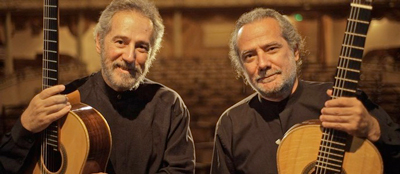by Daniel Hathaway

The Assads programmed Spanish and French music by Fernando Sor, Isaac Albéniz, Joaquin Rodrigo, and Roland Dyens in the first half of their concert. The duo presented Sor’s Fantasia, Op. 54 bis with an easy swing, flair, and rhythmic flexibility.
Albéniz’s Cordoba and El Puerto received playful performances, while Rodrigo’s Tonadilla was spiked with mischievous dissonances and adorned with expressive runs.
“Hillerod” and “Ga-jol Dance,” two excerpts from the Tunisian-born Dyens’ Côté Nord, were jazzy and conversational, sometimes mesmerizing, and included tapping on the bodies of the guitars.
While the Assads made it clear in the first half that they’re veteran entertainers, they sealed that impression in the second with a selection of Brazilian pieces that ranged from art music by Heitor Villa-Lobos to jazz- and pop-inspired pieces by Ramadés Gnattali, Américo Jacomino, Baden Powell, and Paulo Bellinati.
Two Villa-Lobos pieces (“A Lenda do Caboclo” and “Choros No. 5”) were arrangements by Sérgio Assad from piano originals that meld Brazilian elements with European styles of the first half of the 20th century.
In the case of Gnattali’s “Valsa” and “Cora Jaca” from Suite Retratos, the melding included jazz, and the pieces, originally written for traditional Brazilian instruments and string orchestra, were dedicated to Brazilian musicians — in this case Ernesto Nazareth and Chiquinha Gonzaga.
The last three composers on the program were themselves guitarists. Jacomino’s Abismo de Rosas, Powell’s Tempo Feliz, and Bellinati’s Jongo touched base with more elements in Brazilian music: the sweet and sentimental, the Afro-Brazilian and samba, and the rhythmically complex. Jongo was written for the Assad brothers and exists in at least five different configurations.
No matter what the style, the Assads’ playing was vital and riveting, and not a little influenced by flamenco (that’s a good thing). The audience had a deeply satisfying time on Sunday afternoon, and showed it in an enthusiastic ovation.
Opening for the Assads was the Cleveland Guitar Orchestra, prepared and conducted by James Flood. Their performance of one of Haydn’s London Trio movements, with its five independent parts, raised the curtain delightfully for what was to come.
Published on ClevelandClassical.com May 9, 2017.
Click here for a printable copy of this article



